- Home
- Joanne Harris
Different Class Page 2
Different Class Read online
Page 2
The scent reached me as I opened the door. Eau de Room 59, a blend so familiar that for ten months a year I barely notice its presence. And yet here it is again, as nostalgic as burning leaves; a comforting scent of wood, books, polish, geranium, mice, old socks and perhaps a hint of illicit Gauloise. I lit one in celebration, knowing that when Dr Sourgrape Devine – Head of German, Head of Amadeus House and (more’s the pity) Health & Safety Officer to St Oswald’s and the world – made his entrance, such luxuries as a quiet smoke, a pasty or even a Liquorice Allsort (of which I have a small supply hidden in my desk drawer) would be once more forbidden to me.
Speak of the devil. Damn and blast. He must have got in early this morning, because I’d barely blown out the match when I heard a sound of footsteps at my door and glimpsed the end of Devine’s sharp nose behind the panel of frosted glass.
‘Morning, Devine!’ I disposed of match and cigarette under the lid of the Master’s desk.
‘Morning, Straitley.’ The nose twitched, but refrained from comment.
‘Good holiday?’
‘Yes, thank you.’ He and I both know that Dr Devine hates holidays. On the other hand, as a married man, he has, I suppose, some responsibility to Mrs Devine, and so grudgingly, once a year, he packs off to the French Riviera and spends two weeks planning lessons in the shade while his wife – a well-preserved fifty – sunbathes, plays tennis and goes to the spa. ‘And you?’
‘Oh yes. Great fun. Been here long?’
‘Been coming in since last week,’ he said, with a casualness that filled me with suspicion. ‘Things to do. You know what it’s like.’
I certainly do. Any excuse to get back to St Oswald’s. He’s an ambitious chap in spite of his age (sixty, damn him, and looks younger), and he must have guessed that there might soon be a Third Master’s job going begging, or if not, some new and highly paid administrative post. Besides, the New Head will surely need a friend on the ground, and Devine sees no reason for Bob Strange to be the only contender.
‘Inducting new staff?’ I said slyly.
I know that this year, appointments have been mainly overseen by Bob Strange, the New Head and the Bursar; and that as Head of German, Devine feels that he should have had a more central role in the department’s restructuring. Kitty Teague’s promotion to Head of French, for instance, he feels to be inappropriate, and he is aggrieved at the fact that two new appointments have already been made, largely at her discretion. For myself, I’m rather fond of Miss Teague, whom I’ve known since she was a teacher trainee. I think she’ll make a splendid Head of French, and I suspect old Devine knows it too.
As for his own department – well. The new German Master, his protégé, already strikes me as dubious. His name precedes him – Markowicz – though apparently his busy schedule means he won’t be in School until next week. I know that kind of member of staff – the sort who puts administrative work before the lowly business of actually teaching his subject – and I’m not sure his appointment will reflect well on his Head of Department.
‘I’ve not seen much of the new staff,’ said Devine in a frosty voice. ‘Even the New Head—’ He sniffed. Some say the eyes are the mirror of the soul, but in Devine’s case it is the nose that expresses most fully the hidden emotions. His had turned pink, like an albino rabbit’s, and twitched resentfully.
‘Have a Liquorice Allsort,’ I said.
He looked at me as if I’d offered him cocaine. ‘No thanks,’ he replied. ‘I don’t indulge.’
‘A pity,’ I said, selecting a yellow one. ‘I’ve always thought a little indulgence would do you the world of good.’
He gave me a look. ‘You would,’ he said. ‘Have you seen him? The New Head, I mean?’
‘I’m beginning to think he’s the Invisible Man. Still, he’ll be here at eleven o’clock for the Headmaster’s Briefing. I imagine everyone’s curious to see how he’s going to handle the situation. It’s not every day you get to meet a Super-Head.’
Devine gave a percussive sniff.
‘I take it you’ve met.’
‘We exchanged a few words.’
It struck me then that there was something distinctly odd about his manner. Dr Devine has never been the most outspoken of people, especially where criticism of the management is concerned. I wondered what the new man had said to him to provoke such a reaction.
‘And?’ I prompted.
But Devine had regained his usual composure. His allegiance to the management means that whatever his personal dissatisfactions, he does not discuss them with the baser element. ‘You’ll see,’ he said, and left the room, leaving in his wake an unmistakable odour of sanctity.
I spent the following couple of hours going over my records, writing in my diary and enjoying the occasional Liquorice Allsort. St Oswald’s has its own diaries, distributed to boys and staff. The boys use theirs for class notes and Prep; the staff, for planning lessons. Or rather, they did, until three years ago, when the Bursar decreed that the expense was too much of a burden. One more of our traditions gone, although I have kept a small supply of diaries, for personal use, in my stockroom. It’s not the expense I begrudge, but the fact that, on my shelf at home, I have a neatly matched set of thirty-odd School diaries, with our crest in blue and gold, and the School’s motto beneath it. It seems somehow immoral now, at the end of my career, to adopt a new design. The boys may choose what they like, of course, but I’m old-fashioned enough to believe that Prep belongs in a Prep diary, not in a Filofax, or (in the case of my boy Allen-Jones) a shocking-pink notebook with Hello Kitty on the cover.
Tomorrow, the boys return to School. It’s the moment for which I’ve been waiting all summer. Unlike Devine, who has been known to say, without a trace of irony, that the School would be far more efficient without a single boy in the place, I’m very fond of my boys, which is why I have always refused to take on extra administrative tasks, preferring to teach in room 59 rather than push papers in an office. This year, however, the first day of term will mostly serve as a vehicle for various Briefings, plus as a time to digest (and dispute) aspects of the timetable; including cover, free periods and extracurricular duties.
My new timetable is unusually sparse, I notice with disapproval; only twenty-one periods a week compared with the usual thirty-five. Of course everyone knows that Bob Strange (a physicist) views Latin with suspicion, and would like nothing better than to see it vanish from the timetable. So far, however, I have managed to keep control of my one-man department, and in defiance of probability, the results have remained consistently good. Still, this year I see that (no doubt with the help of the New Head), Bob has finally managed (using the National Curriculum as his low excuse) to relegate Latin to an optional subject, and moreover, has placed it in direct competition with German, which means that the serious linguists – those who want to read Languages at A-level and beyond – will have no choice but to opt for German as their second language, and either delay their study of Classics until the Sixth Form (absurd), or (worse still) choose to study Latin at lunchtimes, as an extracurricular activity.
Extracurricular! There was a time in St Oswald’s history when everything was conducted in Latin, including Break, and boys were caned for getting their cases wrong. Rather before my time, I’ll admit. Nevertheless, how dare they?
I spent the next few minutes cursing both the New Head and Bob Strange in Latin, Greek and Anglo-Saxon. Then I cursed Dr Devine, who doubtless will benefit most from the decision, and who has resented my subject since the day he arrived. Devine and I go back a long time – thirty-four years, to be exact – and during that time he has made it clear that he considers Latin obsolete and possibly subversive, interfering as it does with his Teutonic ambition. He is, if not a friend of Strange, at least a fellow-traveller; and I suspect that this relegation of my subject to the option pool is at least partly due to his influence. Still, id imperfectum manet dum confectum erit, as I think Clint Eastwood may have said. There may be one more sh
owdown before either of us hangs up his guns.
At twenty to eleven, I collected my gown from its brass hook at the back of the stock-cupboard door. Twenty years ago, all members of staff wore gowns in School. Now I am more or less alone in continuing the tradition. Still, an academic gown conceals a multitude of sins – chalk dust, tea stains, a copy of Vergil’s poetry set aside for the more tedious meetings. Not that this one would be dull, I thought as I slung on my battered old gown and made my way down to the Staff Common Room in good time for tea and a chocolate biscuit before the Headmaster’s first Briefing of term.
To my surprise, I found the Common Room already crowded. Curiosity, I suppose – besides which there’s not a lot of space when all the staff get together, and, today of all days, no one wanted to miss the chance of a ringside seat.
My favourite chair was unoccupied. Second from the left, under the clock, at a comfortable angle of sixty degrees. Years of judicious lounging have moulded that chair to my exact measurements, and it will take more than a change of Head to affect its contours. I poured a cup of tea from the urn and settled in happily.
Eric Scoones was already there. My colleague for over thirty years, and a friend since childhood, he has the same concerns as I – except that, being a Modern Linguist, he is considered more of an asset to the department, and therefore feels himself to be in a superior position to mine – a fact he likes to emphasize when he is feeling insecure, which, to be fair, is most of the time.
‘Morning, Straitley.’
‘Morning, Scoones.’
The years have left their mark on us all, but on Eric Scoones they have settled like barnacles. The boy I knew at eleven years old – small, clever enough to have been put up a School year, mischievous and quick to flee in the face of trouble – has become a brontosaur; a large, slow half-Centurion with a drinker’s nose and an alarming tendency to wheeze when climbing stairs. The mischievous boy has become a man who sees every setback as a direct blow from the Almighty. A bitter man, who believes that Life has robbed him of pleasures as yet unspecified, and looks upon the success of his friends as a personal defeat. And yet, I’m fond of the old ass, as I believe he is fond of me.
‘Good holiday, Straitley?’
Even after so many years, he calls me by my surname, just as he did when we were boys, more than fifty years ago.
I gave a noncommittal shrug. ‘I’m not sure holidays are my cup of tea. Too stressful.’
Eric gave me a look of weary superiority. ‘I wouldn’t have thought you could ever be stressed. Not with your workload.’
Eric sees my timetable, with its small class sizes and emphasis on the Upper School, as a kind of hobby; a pleasant escape from the realities of teaching Modern Languages. Thus, Eric maintains a pretence of being perpetually overworked, in spite of the fact that he has no form, and therefore claims five extra hours a week to himself, while I have to cater to the needs of my boys, their work and their parents. Having been an indifferent form-tutor for the first ten years of his career, Eric now refuses to have a form, and rather despises, I suspect, the affection in which I hold my boys – a sentiment he feels to be undignified, inappropriate, and which will one day lead to trouble. In spite of this, he has a warm heart, which he hides (rather badly) beneath a façade of gruffness.
‘Spotted any newbies yet?’
This was not an idle question. We lost quite a few people last year, including our Head of Department. This has left the Languages Department sadly depleted, with only the League of Nations (a husband-and-wife team of almost unbearable smugness), plus Eric, Devine, Kitty Teague – and, of course, myself – to man the departmental cannons.
Eric huffed. I took this as an expression of general dissatisfaction. I suspect he had his eye on the Head of Department’s post – in spite of the fact that he ought to be planning his retirement. But Eric is one of the old school, and the promotion of Kitty Teague seems to him unnatural. In our day, women were secretaries, or dinner-ladies, or cleaners. For one to be his superior now goes against every principle.
‘It might as well be a girls’ school,’ Eric said morosely. ‘Two more women appointed for French. That’s what you get when you appoint one as Head of Department.’
I drank my tea and forebore from comment. Male Languages graduates are like hens’ teeth in the teaching profession, and I’m sure Kitty’s judgement is perfectly sound. Still, I’m afraid the appointment of two women to our department is likely to result in a spate of ribaldry from certain of our colleagues – and I don’t expect the Bursar (who considers himself a wit) to refrain from comment.
‘What about the Germans?’ I said.
‘Haven’t seen the new man yet. Apparently, he’s on a course. Won’t be here for another week.’ Eric’s voice was listless. His opinion of members of staff who choose to go on courses, rather than stay in the classroom, is both salty and well documented.
‘What about the New Head?’
Eric shrugged. ‘Not seen him yet. No one has, except the Inner Circle.’
‘What about Devine?’ I said, thinking back to the morning’s brief, uneasy encounter.
‘Oh, he’s over the moon, of course. He thinks the Crisis Team walks on water.’
I shook my head. ‘I saw him today. He seemed a bit – preoccupied.’
‘You mean, he was nosing around again. Sucking up to the Crisis Team in the name of Health & Safety.’ Devine and Eric have never been friends. Eric holds Devine responsible for his own lack of promotion, and Devine considers Eric to be moody and inefficient.
‘Not this time,’ I told him. ‘I got the feeling that somehow Devine wasn’t too impressed with the New Head.’
Eric looked sceptical. ‘Oxbridge man; education guru; charity worker; Superman. What else does he want?’
What else, indeed?
‘Of course,’ said Eric mournfully, ‘some might think that a Head should have spent at least a few years in the classroom. Some might question the wisdom of letting a state-school Yes-man into a place like St Oswald’s.’
I could see his point, of course. A Head starts out at the chalk-face; not in some PR hothouse. And yes, St Oswald’s traditions are not those of the state sector. But crisis measures (and their Heads) are usually short-term investments. St Oswald’s has stood for five hundred years. State-school man or not, I thought; how much damage could he do?
By now it was time for the meeting to start, and yet the famous Super-Head still hadn’t made his appearance. What was the fellow waiting for? I suspected a showman, and, pouring myself another cup of tea, I settled into my armchair and prepared to watch the show.
Five minutes later it began. The door opened; silence fell; a phalanx of Suits entered the room in arrow formation. Bob Strange was among them, his face oddly expressionless, flanked by Devine and the Bursar; but no one paid them much attention. Instead, all eyes were on the newcomers. Two men and one woman – all three smart and so well pressed you could have cut yourself on the creases. The New Head was at the tip of the arrow (I assumed the two Suits were his Crisis Team), and I had time to take in the cut of his suit, the shine on his shoes and a smile that would have made a piano keyboard look narrow before recognition surprised me into a muffled oath and the contents of my teacup soaked my trouser leg and began to trickle inexorably towards my shoes.
A Master never forgets a face, though boys’ names often come and go. I’d put down the name to coincidence – in over forty years of teaching, one tends to encounter most names more than once. But as soon as I saw his face, I knew that my instinct had been right.
Because I knew the man, you see. Dr Harrington, MBE – Johnny Harrington of 3S – returned after twenty years’ absence to inflict fresh misery. There was no chance he wouldn’t recognize me; as he scanned the little crowd our eyes met and his smile broadened still further. He gave me a nod, as if greeting an old friend, and my heart sank like a doomed frigate.
Johnny Harrington, ye gods. My nemesis; my bête noire; the b
oy who almost cost me my job and cost the School a whole lot more. And now he’s a Headmaster, forsooth – not just a Head but a Super-Head – and I could almost find it in me to regret the old New Head, brittle and ineffectual as he was, because a weak Head can easily be carried by a competent deputy or two, but a Super-Head allows no one to be his bearer. A Super-Head follows through. A Super-Head steers his own ship – proudly, yea, even unto the rocks.
And unless young Harrington has changed beyond all recognition over the past twenty years, my guess is that those rocks are precisely where we’re heading.
2
Michaelmas Term, 1981
Dear Mousey,
So this is St Oswald’s. Can’t say I’m impressed. Everything’s so old – the desks, the Honours Boards, the gym, even the staff are all ancient. It’s like being in a museum full of dusty old stuffed animals. Mr Scoones, who shows French films at lunchtimes and probably thinks he’s très cool. Dr Devine, who never smiles. And Mr Straitley – the worst of them, with his Latin jokes and his sarcasm. I wish I was back at Netherton Green. I wish I was in a different class.
So many people are animals, under the skin and the uniform. A pig, an elephant, a dog. With his big head and curly hair, Mr Straitley’s a pantomime lion, playing to the gallery of all his baying sycophants. Mr Scoones is a bullfrog, full of air and pompousness. Dr Devine is a mantis, all brittle and righteous. Most of the boys are dogs, of course. Running in packs, begging for scraps, yapping ‘Yes sir, no sir.’ I used to have a dog, you know. Not for long. I hate dogs.
The Head of St Oswald’s is Dr Shakeshafte. He looks like a pig. Small eyes, big nose. The other boys call him ‘SS’. At first I thought that this was because he was a German teacher, but now I think it’s something rude. I don’t like him either. On my first day he yelled at me for going the wrong way down South Stair. South Stair. In the singular. That’s what they call it here. In fact, there are forty-three (plural) stairs, but apparently St Oswald’s rules override the rules of grammar.

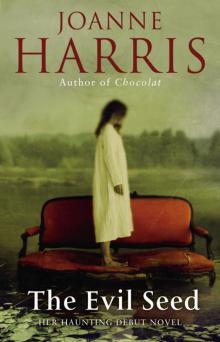 The Evil Seed
The Evil Seed Gentlemen and Players
Gentlemen and Players A Cat, a Hat, and a Piece of String
A Cat, a Hat, and a Piece of String Different Class
Different Class Chocolat
Chocolat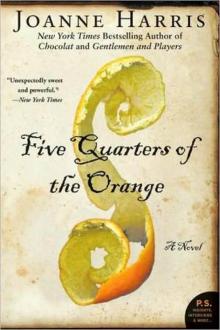 Five Quarters of the Orange: A Novel
Five Quarters of the Orange: A Novel A Pocketful of Crows
A Pocketful of Crows Runelight
Runelight Runemarks
Runemarks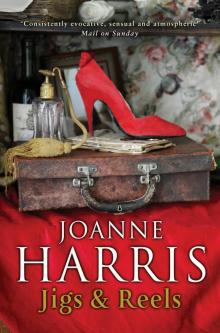 Jigs & Reels: Stories
Jigs & Reels: Stories Sleep, Pale Sister
Sleep, Pale Sister Holy Fools
Holy Fools The Testament of Loki
The Testament of Loki Peaches for Monsieur Le Curé
Peaches for Monsieur Le Curé Blueeyedboy
Blueeyedboy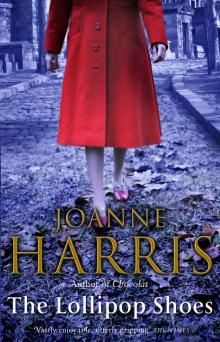 The Lollipop Shoes
The Lollipop Shoes Coastliners
Coastliners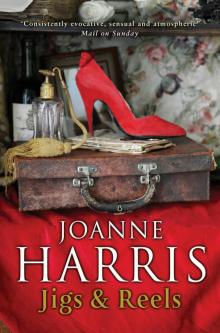 Jigs & Reels
Jigs & Reels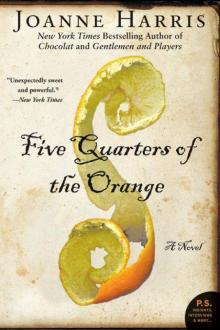 Five Quarters of the Orange
Five Quarters of the Orange